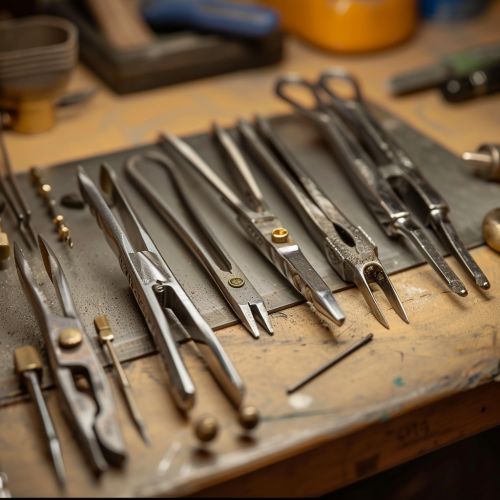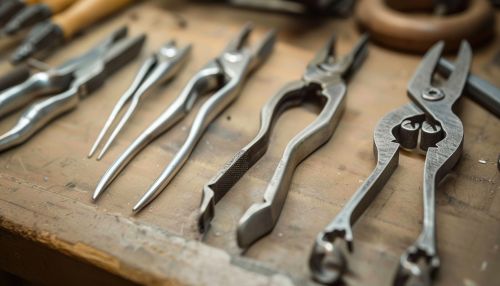Jeweler's forceps
Introduction
Jeweler's forceps, also known as precision tweezers, are specialized tools used extensively in the field of jewelry making and repair. These forceps are designed to handle small, delicate components with high precision and control. They are essential for tasks such as setting gemstones, manipulating fine wires, and assembling intricate pieces. This article delves into the various types, materials, and applications of jeweler's forceps, providing a comprehensive understanding of their role in the jewelry industry.
Types of Jeweler's Forceps
Jeweler's forceps come in a variety of shapes and sizes, each tailored to specific tasks. The most common types include:
Straight Tip Forceps
Straight tip forceps are the most basic type, featuring a simple, straight design. They are used for general purposes such as picking up and placing small objects. These forceps are ideal for tasks that require a firm grip and straightforward manipulation.
Curved Tip Forceps
Curved tip forceps have a slight bend at the tip, allowing for better access to hard-to-reach areas. These are particularly useful when working on intricate designs where a straight approach is not feasible.
Fine Tip Forceps
Fine tip forceps have extremely narrow tips, making them perfect for handling the smallest components, such as tiny gemstones or fine wires. These forceps are essential for tasks that require a high degree of precision.
Cross Locking Forceps
Cross locking forceps, also known as self-closing forceps, feature a mechanism that keeps the tips closed without the need for constant pressure from the user. This design is beneficial for tasks that require a steady grip over extended periods.
Diamond Tipped Forceps
Diamond tipped forceps are equipped with tips coated in diamond dust, providing an exceptionally firm grip on slippery materials. These are particularly useful for handling gemstones, as the diamond coating prevents slippage and potential damage to the stones.


Materials and Construction
The materials used in the construction of jeweler's forceps are crucial to their performance and durability. Common materials include:
Stainless Steel
Stainless steel is the most widely used material for jeweler's forceps due to its strength, corrosion resistance, and longevity. It provides a good balance between rigidity and flexibility, making it suitable for a wide range of applications.
Titanium
Titanium forceps are lightweight and highly resistant to corrosion. They are particularly useful in environments where exposure to chemicals or moisture is a concern. Additionally, titanium's non-magnetic properties make these forceps ideal for working with sensitive electronic components.
Carbon Steel
Carbon steel forceps are known for their exceptional hardness and sharpness. However, they are more prone to rust and require regular maintenance to prevent corrosion. These forceps are often used for tasks that demand a very sharp and precise grip.
Plastic
Plastic forceps are used in situations where metal forceps might cause damage to delicate components. They are non-conductive and non-magnetic, making them suitable for handling electronic parts and other sensitive materials.
Applications in Jewelry Making
Jeweler's forceps are indispensable tools in various stages of jewelry making, including:
Gemstone Setting
One of the primary uses of jeweler's forceps is in the setting of gemstones. The precision and control offered by these tools allow jewelers to place stones accurately into their settings without causing damage.
Wire Manipulation
Jeweler's forceps are also used extensively in the manipulation of fine wires. Whether it's bending, twisting, or cutting, these tools provide the necessary precision to work with delicate wires without breaking them.
Assembly and Repair
In the assembly and repair of jewelry, jeweler's forceps are used to hold and position small components, such as clasps, links, and pins. Their ability to provide a steady grip is crucial for ensuring that these components are securely attached.
Engraving and Detailing
For tasks that require intricate detailing, such as engraving, jeweler's forceps help in holding the piece steady, allowing the jeweler to focus on creating precise designs.
Maintenance and Care
Proper maintenance and care are essential to ensure the longevity and performance of jeweler's forceps. Key practices include:
Cleaning
Regular cleaning is necessary to remove any debris or residue that may accumulate on the forceps. This can be done using a soft brush and mild detergent, followed by thorough drying to prevent rust.
Lubrication
Applying a small amount of lubricant to the pivot points of the forceps can help maintain smooth operation. It's important to use a lubricant that is compatible with the material of the forceps.
Storage
Storing jeweler's forceps in a dry, protected environment is crucial to prevent damage and corrosion. Using a dedicated tool box or case can help keep the forceps organized and in good condition.
Conclusion
Jeweler's forceps are essential tools in the field of jewelry making, offering precision and control for a wide range of tasks. Understanding the different types, materials, and applications of these forceps can help jewelers select the right tool for their specific needs. Proper maintenance and care are also crucial to ensure the longevity and performance of these indispensable tools.
